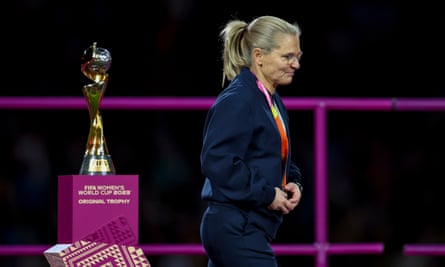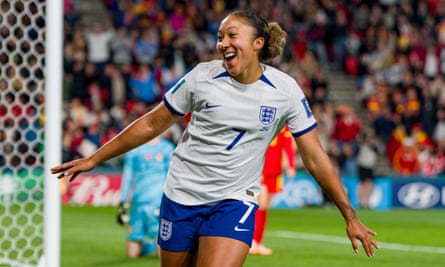After England’s Euros triumph and defeat of the USA in a friendly in October, confidence was overflowing looking towards the World Cup. The Lionesses appeared strong enough to seriously challenge for football’s biggest prize.
The loss of the Euros golden boot and golden ball winner Beth Mead to an ACL injury that would almost certainly end her World Cup dream was a blow, but one that could be taken; the depth was there. Then came knee injuries to the captain Leah Williamson, another ACL, and magical No 10 Fran Kirby. All that remained of England’s Euros spine, with the retirement of the striker Ellen White, was the goalkeeper Mary Earps and defensive midfielder Keira Walsh.
Which would be the one that made it one too many absences? Surely, the hull of England’s squad could take only so many hits before it sprang a leak. Expectations were tempered. Instead of wondering how fast England’s ship could sail, fans were left wondering whether it could stay afloat. Talk of a trophy became talk of how far England could go: semi-finals, quarter-finals, even last 16?
The team’s first defeat under Sarina Wiegman came shortly before the tournament, a 2-0 loss to the World Cup co-hosts Australia in April. How would that affect morale just three months out? Would the air of invincibility fade? Would the row over performance-related bonuses rupture the togetherness between the players, staff and Football Association?
Haiti was a struggle, England labouring against the World Cup debutants, but a Georgia Stanway penalty helped them over the line. Lauren James’s sixth minute strike earned victory over Denmark but still the team laboured. The loss of Walsh to what had appeared to be a serious knee injury felt like the nail in the coffin of any remaining title aspirations. Of all England’s players, she was the irreplaceable cog. Until she wasn’t.
Wiegman and her assistant, Arjan Veurink, masterminded a change in formation that would shift England’s fortunes. A back three was deployed for the final group game against China, with a double pivot of Stanway and Katie Zelem compensating for the loss of Walsh. England were thrillingly unpredictable, they seemed to have found their rhythm, but it didn’t quite continue that way. Instead, the team looked a shadow of the side that delighted last year at the Euros, that just got better and better. In a way, though, their performance on the world stage was the more impressive.

Sarina Wiegman underlined her coaching talent in Australia even though England came up short in the final. Photograph: DeFodi Images/Getty Images
Nigeria stifled England, Halimatu Ayinde so exceptional in her marking of James that the frustrated midfielder would earn a red card and a two-match ban for stepping on the bum of Michelle Alozie as the Nigeria player lay prone on the ground. Despite being made to work, England prevailed on penalties. Chloe Kelly’s winning spot-kick was symbolic of England’s run, a cool, calm, powerfully hit and confident strike that was faster than any goal in the Premier League last season. Then there was the fightback against Colombia from a goal down and a clinical and composed 3-1 defeat of Australia in the semi-finals to destroy the growing hopes of a nation that had woken up to women’s football in style.
They were tested, dealt harder and more complex hands and, somehow, they navigated everything thrown at them, powered by passion, trust, belief and the unrivalled skills of Wiegman and Veurink. Defeat in the final, going so close to the biggest of prizes, walking past the trophy they could not touch, will hurt. But making the final in the face of so much adversity was truly impressive.
With the winners Spain’s off-field trouble with their hated coach, Jorge Vilda, added into the mix, this was a final which showcased the triumph of resilience, in all its forms. The grotesque sexual assault by the ** Spanish FA president, Luis Rubiales, during the presentation ceremony when he planted a kiss on the lips of Jenni Hermoso before being seen reaching round to kiss the cheek of goalscorer Olga Carmona and at one point grabbing his crotch in celebration, speaks to how deeply resilient some players have had to be.
Although Spain were superior in the final, England were a crossbar away from taking the lead, close to levelling and perhaps a misjudged substitution away strategically. The margin was narrower than Spain’s domination suggested as England defended for their lives.
What next for England? Well, there is no going backwards. Mead, Williamson and Kirby will return for the next phase. James has demonstrated enough talent on the biggest of stages to make a case for the team being built around getting the best out of her. Wiegman will undoubtedly have a World Cup itch that needs scratching after her second failure in the final. Hopefully she sees England as the team she wants to do that with.

Lauren James made a case at the World Cup, despite her red card, for the England team being built around her. Photograph: Andy Cheung/Getty Images
England’s future looks bright. They reached a first final against the odds; imagine what they could look like moving forward. The foundations have been laid for long-term sustained success. Far from being the end of a cycle, this is just the start. Keep Wiegman and continue along this path and the Lionesses will be challenging at the top for the next decade or more. Next? Earning Olympic qualification for Team GB by reaching February’s Nations League final, then a defence of their European title. The tournaments keep rolling round. How quickly they can put this heartbreak behind them will be key.



